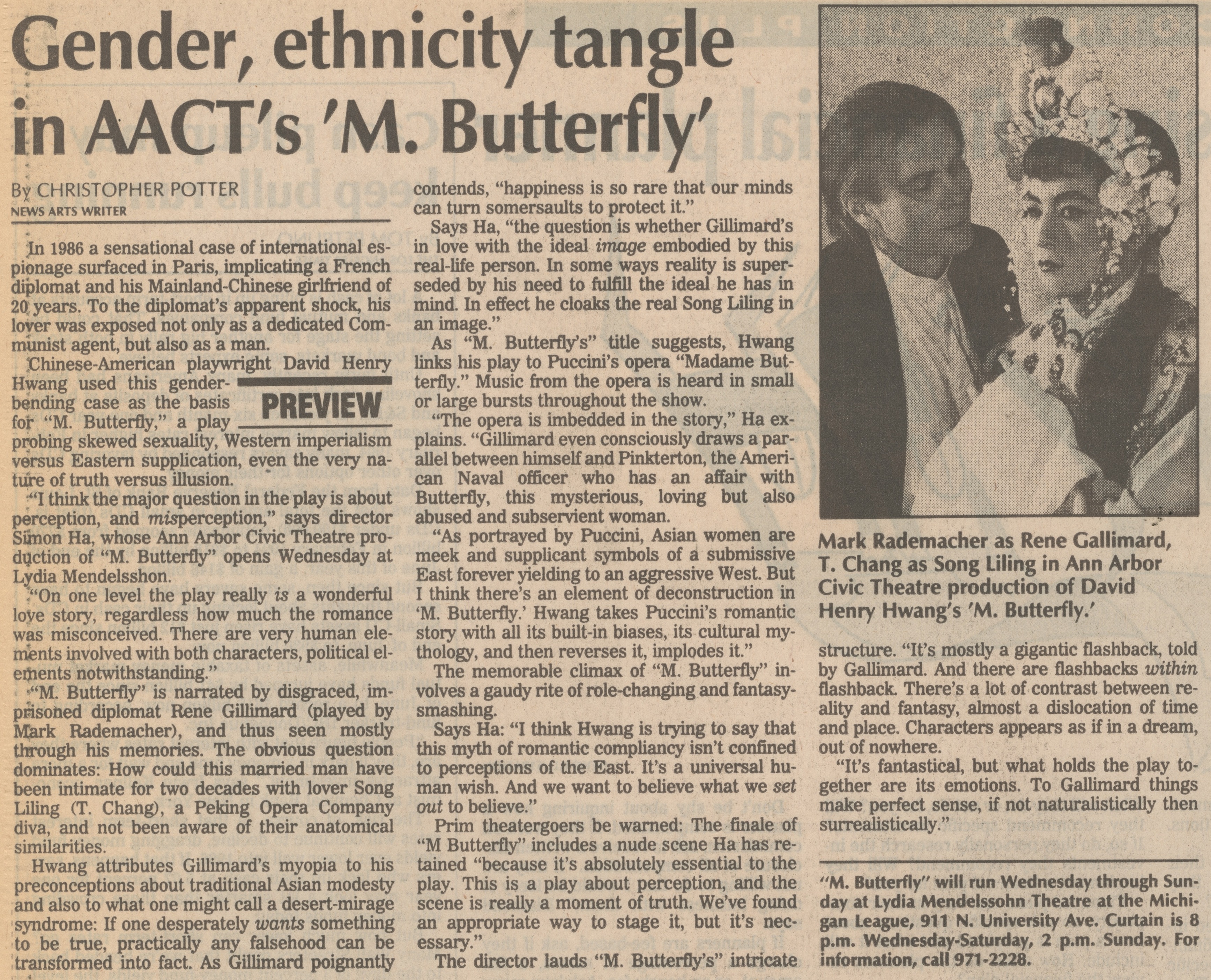Gender, Ethnicity Tangle In AACT's 'M. Butterfly'

Gender, ethnicity tangle in AACT's 'M. Butterfly'
By CHRISTOPHER POTTER
NEWS ARTS WRITER
PREVIEW
In 1986 a sensational case of international espionage surfaced in Paris, implicating a French diplomat and his Mainland-Chinese girlfriend of 20 years. To the diplomat’s apparent shock, his lover was exposed not only as a dedicated Communist agent, but also as a man.
Chinese-American playwright David Henry Hwang used this gender-bending case as the basis for “M. Butterfly,” a play probing skewed sexuality, Western imperialism versus Eastern supplication, even the very nature of truth versus illusion.
“‘I think the major question in the play is about perception, and misperception,” says director Simon Ha, whose Ann Arbor Civic Theatre production of “M. Butterfly” opens Wednesday at Lydia Mendelsshon.
“On one level the play really is a wonderful love story, regardless how much the romance was misconceived. There are very human elements involved with both characters, political elements notwithstanding.”
“M. Butterfly” is narrated by disgraced, imprisoned diplomat Rene Gillimard (played by Mark Rademacher), and thus seen mostly through his memories. The obvious question dominates: How could this married man have been intimate for two decades with lover Song Liling (T. Chang), a Peking Opera Company diva, and not been aware of their anatomical similarities.
Hwang attributes Gillimard’s myopia to his preconceptions about traditional Asian modesty and also to what one might call a desert-mirage syndrome: If one desperately wants something to be true, practically any falsehood can be transformed into fact. As Gillimard poignantly contends, "happiness is so rare that our minds can turn somersaults to protect it.”
Says Ha, “the question is whether Gillimard’s in love with the ideal image embodied by this real-life person. In some ways reality is superseded by his need to fulfill the ideal he has in mind. In effect he cloaks the real Song Liling in an image.”
As “M. Butterfly’s” title suggests, Hwang links his play to Puccini’s opera “Madame Butterfly.” Music from the opera is heard in small or large bursts throughout the show.
“The opera is imbedded in the story,” Ha explains. “Gillimard even consciously draws a parallel between himself and Pinkterton, the American Naval officer who has an affair with Butterfly, this mysterious, loving but also abused and subservient woman.
“As portrayed by Puccini, Asian women are meek and supplicant symbols of a submissive East forever yielding to an aggressive West. But I think there’s an element of deconstruction in ‘M. Butterfly.’ Hwang takes Puccini’s romantic story with all its built-in biases, its cultural mythology, and then reverses it, implodes it.”
The memorable climax of “M. Butterfly” involves a gaudy rite of role-changing and fantasy-smashing.
Says Ha: “I think Hwang is trying to say that this myth of romantic compliancy isn’t confined to perceptions of the East. It’s a universal human wish. And we want to believe what we set out to believe.”
Prim theatergoers be warned: The finale of “M Butterfly” includes a nude scene Ha has retained “because it’s absolutely essential to the play. This is a play about perception, and the scene is really a moment of truth. We’ve found an appropriate way to stage it, but it’s necessary.”
The director lauds “M. Butterfly’s” intricate structure. “It’s mostly a gigantic flashback, told by Gallimard. And there are flashbacks within flashback. There’s a lot of contrast between reality and fantasy, almost a dislocation of time and place. Characters appears as if in a dream, out of nowhere.
“It’s fantastical, but what holds the play together are its emotions. To Gallimard things make perfect sense, if not naturalistically then surrealistically.”
Mark Rademacher as Rene Gallimard, T. Chang as Song Liling in Ann Arbor Civic Theatre production of David Henry Hwang's 'M. Butterfly.'
"M. Butterfly'' will run Wednesday through Sunday at Lydia Mendelssohn Theatre at the Michigan League, 911 N. University Ave. Curtain is 8 p.m. Wednesday-Saturday, 2 p.m. Sunday. For information, call 971-2228.